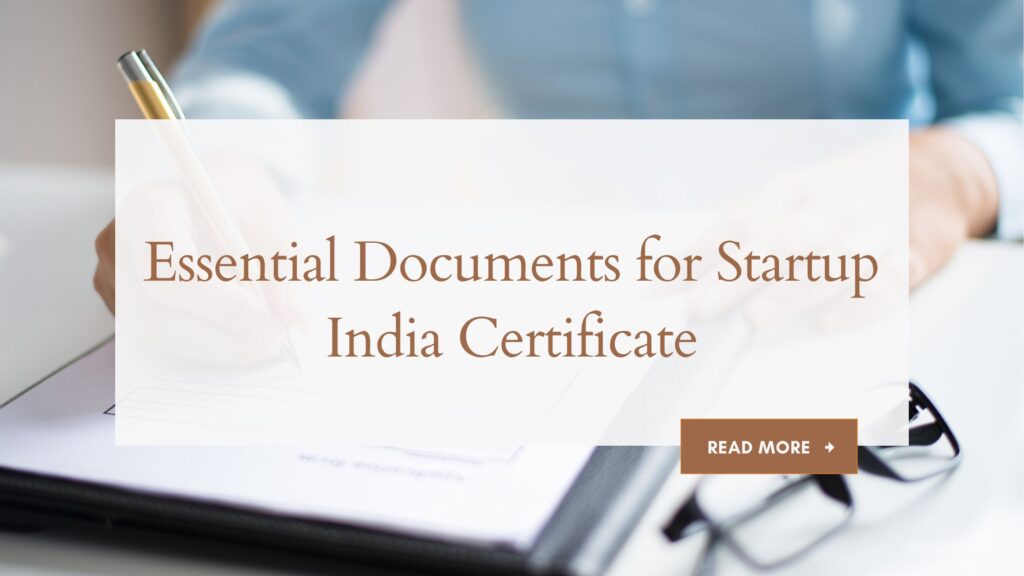
Getting your start-up officially recognized under the Start-up India initiative can unlock numerous benefits, from tax exemptions to easier compliance requirements. However, many entrepreneurs stumble at the first hurdle: gathering the right documents required for Start-upIndia certificate application.
If you’re planning to apply for recognition under this government scheme, understanding the documentation requirements upfront can save you weeks of back-and-forth with authorities. This comprehensive guide breaks down every document you’ll need, explains why each one matters, and shows you how to prepare a winning application.
What is the Start-up India Certificate?
The Start-up India Certificate, officially known as the Certificate of Recognition, is issued by the Department for Promotion of Industry and Internal Trade (DPIIT). This recognition validates your business as a legitimate start-up under government guidelines and opens doors to various benefits including tax holidays, faster patent processing, and simplified compliance procedures.
To qualify, your business must meet specific criteria: it should be less than 10 years old, have an annual turnover under ₹100 crores, and work toward innovation or improvement of existing products or services. Most importantly, you need the right documents required for Start-up India certificate approval.
Why Professional Help Matters
Navigating the Startup India certification process can be complex, especially when dealing with documents required for Start-up India certificate and compliance issues. This is where professional legal and advisory services become invaluable.
VS IPR & LEGAL ADVISOR stands out as a trusted partner for start-ups in Mumbai seeking Start-up India certification and related legal services. Their team of experienced professionals understands the nuances of start-up documentation and can guide you through the entire process seamlessly.
Core documents required for start-up India certificate
1. Certificate of Incorporation / Registration
This is your business’s birth certificate. Depending on your business structure, you’ll need:
For Private Limited Companies: Certificate of Incorporation issued by the Registrar of Companies (ROC). This document proves your company’s legal existence and shows the date of incorporation, which is crucial for the “less than 10 years old” criterion.
For Limited Liability Partnerships (LLPs): Certificate of Incorporation from ROC along with LLP Agreement. The LLP structure is popular among start-ups due to its flexibility and limited liability protection.
For Partnership Firms: Partnership Deed Along with Registered certificate with the Registrar of Firms. This document should clearly outline profit-sharing ratios, roles of partners, and business objectives.
2. Memorandum and Articles of Association
For companies and LLPs, these documents define your business’s constitution. The Memorandum of Association (MOA) outlines your company’s objectives, authorized capital, and scope of activities. The Articles of Association (AOA) detail internal management rules and procedures.
These documents are critical because they demonstrate your start up’s innovative intent and business model. Ensure your MOA clearly reflects activities aligned with innovation, development, or improvement of products or services.
3. Proof of Business Activities
You need evidence that your start-up is actively working on innovation. Acceptable documents include:
Business Plan / Pitch Deck/ Website: A comprehensive document outlining your innovative idea, market analysis, revenue model, and growth projections. This should clearly demonstrate how your start-up addresses a market need through innovation.
Prototype or MVP Documentation: If you’ve developed a minimum viable product, include screenshots, user manuals, or demonstration videos. For tech start-up’s, this could be app store listings or software documentation.
MSME: For Start-up India Registration, an MSME (Udyam) Certificate is not mandatory, but it adds strong support because it shows your business is formally recognized as a micro, small, or medium enterprise.
IP Registrations: Any intellectual property filings strengthen your application significantly. Include patent application numbers, trademark registrations, or copyright certificates.
Research and Development Records: Documentation of R&D activities, including research reports, lab results, or collaboration agreements with research institutions.
Supporting Documentation
Director/Partner/Proprietor Information
Identity Proof: PAN cards, Aadhaar cards, or passports of all directors, partners, or the proprietor.
Address Proof: Utility bills, rental agreements, or property documents for registered office address.
Photographs: Recent passport-size photographs of all key personnel.
Statutory Declarations
Self-Certification: A declaration stating that your entity meets all eligibility criteria for start-up recognition. This includes confirming the business age, turnover limits, and innovative nature.
Board Resolution: For companies, a board resolution authorizing the application for Start-up India recognition. This should be properly signed and stamped.
Digital Signatures and Authorizations
Digital Signature Certificate (DSC): Application require Organization based digital signatures from authorized signatories.
Industry-Specific Requirements
Technology start-up’s
Tech companies should include additional documentation like:
- Software architecture diagrams
- User acquisition metrics
- Technology stack documentation
- API documentation or technical specifications
Manufacturing Start-up’s
Manufacturing businesses need:
- Factory registration certificates
- Pollution clearance certificates
- Quality certifications (ISO, BIS, etc.)
- Product testing reports
Service-Based Start-up’s
Service providers should include:
- Service portfolio documentation
- Client testimonials or case studies
- Process innovation documentation
- Service delivery frameworks
Common Documentation Mistakes to Avoid
Mismatched Information
Inconsistencies between different documents can delay your application. Double-check that company names, addresses, and dates match across all submissions.
Generic Business Plans
Avoid template-based business plans that don’t clearly articulate your innovative approach. Your business plan should specifically highlight what makes your solution unique and innovative.
The Application Process: Step by Step
Pre-Application Preparation
Before starting your online application, organize all documents in digital format. Scan physical documents at high resolution and ensure all text is clearly readable.
Online Registration
Visit the NSWS and create your account. Fill out the application form carefully, ensuring all information matches your supporting documents.
Document Upload
Upload documents in the specified formats (usually PDF). Follow file size restrictions and naming conventions provided on the portal.
Review and Submission
Review your application thoroughly before submission. Once submitted, tracking your application status becomes crucial for follow-up actions.
Why Professional Help Matters
Navigating the Start-up India certification process can be complex, especially when dealing with document requirements and compliance issues. This is where professional legal and advisory services become invaluable.
VS IPR & LEGAL ADVISOR stands out as a trusted partner for start-up in Mumbai seeking Start-up India certification and related legal services. Their team of experienced professionals understands the nuances of start-up documentation and can guide you through the entire process seamlessly.
Services Offered by VS IPR & LEGAL ADVISOR
Document Preparation and Review: They help prepare and review all required documents, ensuring compliance with current regulations and requirements.
Application Filing: Their experts handle the complete application process, from initial registration to final submission, reducing the risk of errors or rejections.
Compliance Management: Beyond certification, they provide ongoing compliance support to maintain your start-up status and benefits.
IP Services: As specialists in intellectual property, they can help strengthen your application with proper patent and trademark filings.
Legal Advisory: Their comprehensive legal services cover everything from company incorporation to contract drafting and regulatory compliance.

Benefits of Professional Assistance
Working with experienced advisors like VS IPR & LEGAL ADVISOR offers several advantages:
Time Savings: Professional handling reduces the time spent on documentation and follow-ups, allowing you to focus on building your business.
Higher Success Rates: Expert knowledge of requirements and common pitfalls significantly increases your chances of first-time approval.
Ongoing Support: Professional relationships extend beyond certification, providing valuable legal and compliance support as your startup grows.
Cost Efficiency: While there’s an upfront cost, professional services often prove more economical than dealing with rejections, resubmissions, and compliance issues.
Post-Certification
Benefit Utilization
Actively utilize the benefits available to recognized start-up’s, from tax holidays to fast-track patent processing.
Learning & Development Programs: Once registered under Start-up India, you gain access to various government-backed learning and development initiatives, including free courses, workshops, mentorship sessions, and capacity-building programs designed to help start-up’s grow and scale.
Conclusion
Obtaining a Start-up India Certificate requires careful preparation and attention to detail, particularly when it comes to documentation. The key to success lies in understanding exactly what’s required, preparing comprehensive documentation, and ensuring everything aligns with your innovative business model.
While the process might seem daunting, the benefits of recognition under the Start-up India initiative make it worthwhile. From tax benefits to simplified compliance, EMD exemption in Government Tender and faster IP processing, certified start-up’s gain significant advantages in their growth journey.
For entrepreneurs in Mumbai and beyond, partnering with experienced professionals like VS IPR & LEGAL ADVISOR can transform a potentially complex process into a smooth, efficient experience. Their expertise in start-up documentation, combined with comprehensive legal and IP services, makes them an ideal partner for your certification journey.
Don’t let documentation challenges delay your start-up’s official recognition. Start preparing your documents today, and consider professional assistance to ensure your application succeeds on the first attempt. Your Start-up India Certificate is more than just recognition it’s your gateway to a supportive ecosystem designed to help innovative businesses thrive.
Remember, proper documentation today sets the foundation for your start-up’s compliant and successful future. Take the time to get it right, and reap the benefits for years to come.





